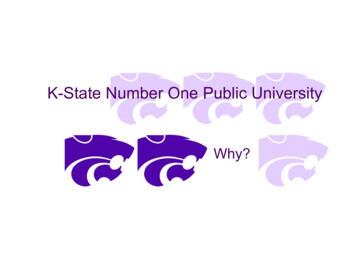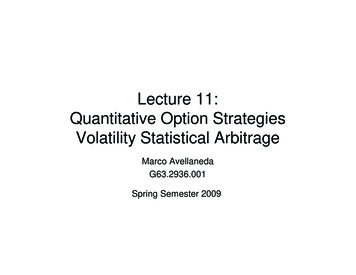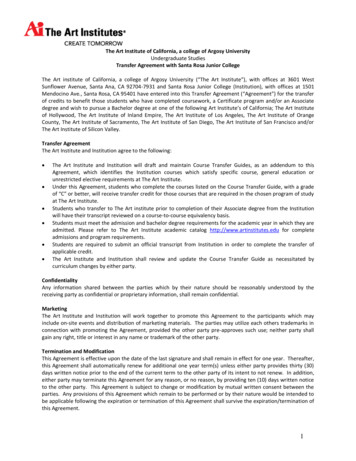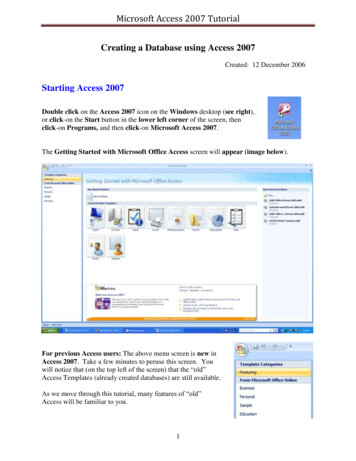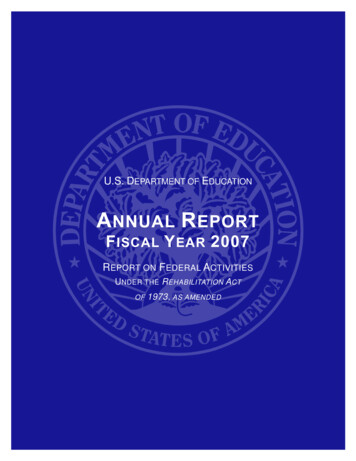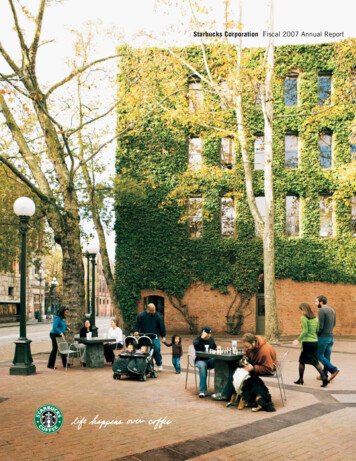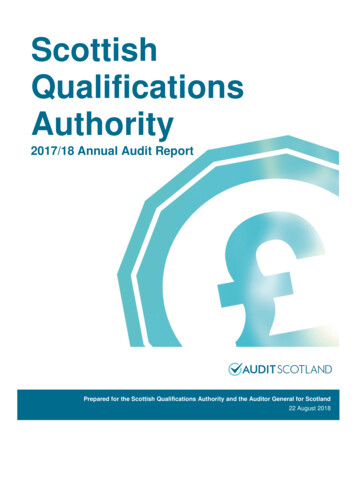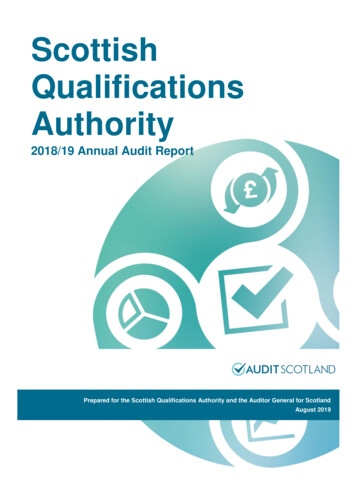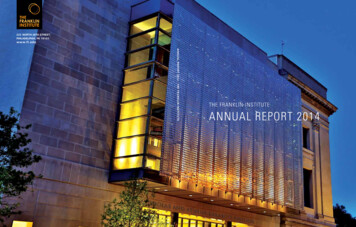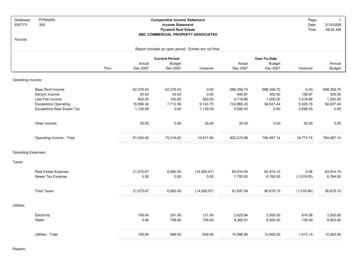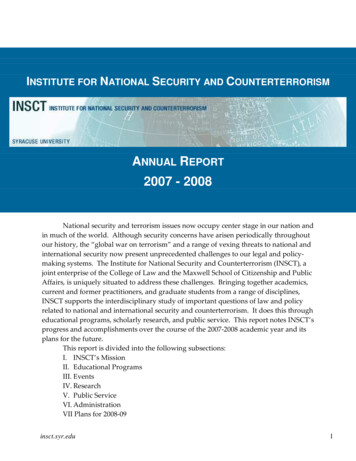
Transcription
INSTITUTE FOR NATIONAL SECURITY AND COUNTERTERRORISMANNUAL REPORT2007 - 2008National security and terrorism issues now occupy center stage in our nation andin much of the world. Although security concerns have arisen periodically throughoutour history, the “global war on terrorism” and a range of vexing threats to national andinternational security now present unprecedented challenges to our legal and policymaking systems. The Institute for National Security and Counterterrorism (INSCT), ajoint enterprise of the College of Law and the Maxwell School of Citizenship and PublicAffairs, is uniquely situated to address these challenges. Bringing together academics,current and former practitioners, and graduate students from a range of disciplines,INSCT supports the interdisciplinary study of important questions of law and policyrelated to national and international security and counterterrorism. It does this througheducational programs, scholarly research, and public service. This report notes INSCT’sprogress and accomplishments over the course of the 2007-2008 academic year and itsplans for the future.This report is divided into the following subsections:I. INSCT’s MissionII. Educational ProgramsIII. EventsIV. ResearchV. Public ServiceVI. AdministrationVII Plans for 2008-09insct.syr.edu1
I. MISSIONINSCT builds on existing expertise and strengths of the faculty and theUniversity, joining law and policy to address important issues related to national andinternational security and counterterrorism. Faculty affiliated with INSCT from theCollege of Law, the Maxwell School of Citizenship and Public Affairs, the S.I.Newhouse School of Public Communications, and from other colleges and institutionsbring expertise in military planning and operations, global counterterrorism and armscontrol, counter-proliferation policy, diplomacy and international relations, terroristmethods and psychology, history, law, communication, anthropology, and economics.Of course, real progress in today’s security environment requires activeparticipation in the global security community. In the fall of 2005, Syracuse University’sMaxwell School and INSCT partnered with the Interdisciplinary Center’s Lauder Schoolof Government, Diplomacy & Strategy and its academic center, the Institute forCounter-Terrorism (ICT), in Herzliya, Israel. As the principal entities responsible foractivities that relate directly to counter-terrorism and homeland security, ICT andINSCT are developing collaborative research and educational programs. In keepingwith this principle of international collaboration, INSCT intends to developpartnerships with other universities in the region.While maintaining its national security and counterterrorism focus, INSCT’ssubstantive areas of concentration have evolved to include issues of both internationalscope – the laws of armed conflict – and local application – the homeland securityefforts conducted in New York State.II. EDUCATIONAL PROGRAMSNational Security and Counterterrorism Law CertificateCertificate of Advanced Study in Security StudiesForeign Study Program at the Institute for Counter-Terrorism, Herzliya, IsraelStudent Association on Terrorism and Security Analysis (SATSA)Of its main areas of operation, INSCT’s greatest strength lies in its provision ofeducational programs. INSCT administers two certificates - one for law students andone for graduate students. In addition, as part of the Maxwell/INSCT partnership withinsct.syr.edu2
IDC and ICT, INSCT established a summer foreign study program in Israel, now in itsthird year. Ten graduate and law students will participate in this program in the 2008summer session. INSCT also supports independent student endeavors by cosponsoring the Student Association on Terrorism and Security Analysis (SATSA).National Security and Counterterrorism Law Certificate. Offered since 2003, thefifteen-credit National Security and Counterterrorism Law Certificate requires studentsto take two base courses addressing national security law generally, and three electivecourses which focus on different aspects of national and international security law andpolicy. Additionally, students must submit a research paper of at least 25 pages on arelated topic of national security or counterterrorism. Current base course offeringsinclude: National Security Law (two sections of this course were taught in the fall 2007semester)Counterterrorism and the Law,Perspectives on Terrorism, andthe National Security and Counterterrorism Research Center (a research andwriting course).Electives include law courses such as Prosecuting Terrorists in Article III Courts,International Law, International Human Rights, and Law of Armed Conflict, and graduatecourses such as International Security, Homeland Security, and Responding to Proliferation ofWMDs.In 2008, twenty-three students graduated with a National Security andCounterterrorism Law Certificate. To date, this is the largest group of students tograduate from the law school with the certificate in national security, and it brings thetotal of law certificates awarded since 2004 to eighty-three.Certificate graduates are currently working for such agencies as the CentralIntelligence Agency Office of General Counsel; the Federal Bureau of Investigation’sCounterintelligence Division; U.S. Customs and Border Patrol General Counsel; theInstitute for Defense Analysis; Defense Intelligence Agency; U.S. Department ofHomeland Security, and Army and Navy JAG.insct.syr.edu3
2008 National Security and Counterterrorism Law Certificate graduatesFrom left to right: (front row): Keli Perrin, INSCT Asst. Director, Manish Pradhan,Jennifer Holtz, MacKay Tolboe, Catherine Baker, Jeffrey Rosenthal, Rafiel Warfield, INSCTDirector William Banks ( back row): Justin Huffman, Jonathan Panikoff, Paul Dimoh ,Sarah LaBelle, Nelson Mendes, Stephanie Gonzalez, Michael Messinger, Meghen Pitts,Steven Porzio.Not pictured: Naureen Anwar, Amanda Brown, Jacqueline McCain, Divya Pakkiasamy,Eric Sawyer, Brent Surgeoner, Shrikant Vardhan, Onechuel WuCertificate of Advanced Study in Security Studies. This was the third year of thetwelve-credit Certificate of Advanced Study in Security Studies. In 2008, thirtygraduate students earned the certificate. These students included: seven from the masters of public administration program three from the executive masters of public administration program, nine from the masters of international relations (IR) program three earning masters in both international relations and publicadministration, one earning a doctor of philosophy in history, three earning both a masters of arts in public administration and jurisdoctorate, and two earning a masters of international relations and a jurisdoctorate. one from the joint Public Diplomacy/IR programinsct.syr.edu4
one earning a dual degree in IR and economicsTo earn the certificate, students must take four courses: two foundation basecourses which address issues of national and international security policy, history, andlaw; and two elective courses which focus on a range of more specific security issues.The current base course offerings include: U.S. National Security and Foreign Policy (public administration andpolitical science), International Security (public administration), Comparative Civil-Military Relations (political science), National Security Law (law), Homeland Security: Federal Policy and Implementation Challenges (publicadministration), and History of International Relations (2007-2008 AY only)Electives cover such topics as the asymmetric uses of force, nuclear proliferation,international organizations, peacekeeping, crisis management, and foreign policy. Thesecourses are offered in a range of departments including public administration,international relations, political science, history, law, anthropology, communication,and business administration.The Perspectives on Terrorism course is a prime example of INSCT’s unique, interdisciplinary approach to security studies. The course is cross listed in threedepartments and engages faculty and students from the disciplines of law, politicalscience, history, and public administration.* This course was offered in the Spring 2008semester, and was taught by law professor David Crane, political science professorMichael Barkun, and history professor David Bennett.Maxwell Dean Mitchel Wallerstein and INSCT Assistant Director Keli Perrindeveloped a new course on homeland security which was taught for the first timeduring the spring 2008 semester. This course, “Homeland Security: Federal Policy andImplementation Challenges,” was offered through the public administrationdepartment, but drew students from a number of disciplines including law, publicadministration and international security. The course will be taught again in spring2009.*This course and approach are described by Professor Banks in his article, “Teaching and Learning About Terrorism,”which was published in the fall 2005 Journal of Legal Education – see http://insct.syr.edu/Programs.htm.insct.syr.edu5
Certificate graduates are currently working for such agencies as the U.SDepartment of State Division of Arms Control, the U.S. Department of HomelandSecurity’s section for Intelligence and Analysis, the Open Source Center at the CentralIntelligence Agency, and the Saudi Arabian Ministry of Foreign Affairs.2008 Certificate of Advance Study in Security Studies GraduatesFrom left to right (front row): Marcie Hawranik, Natalya Grokh, Kerry Hyre, Ashley Volkmar,Manish Pradhan, Professor Renee de Nevers (back row): INSCT Director William Banks,Oliver Koch, Reza Sinsuat, Andrew Jesmain, Hamid Saboory, Nicholas Psyhos, Joseph Nosse,Jonathan Panikoff, Nicholas ArmstrongNot pictured: Erin Cole, Teara Collins, Edward Cox, Austin Cusak, Marie Claude Francour,Martin Gutman, Eric Kempen, Christopher Lee, Alexander Millington, Soudeh Motamedi, EricOddo, Nina Popel, Andrew Stegmaier, Edward Ian Swallow, Daniel WearsFaculty and Courses. These certificate programs are made possible through theefforts of over twenty faculty members from the Maxwell School and the College ofLaw who teach courses addressing security related topics. Adding to the esteemedfaculty this year, INSCT was fortunate to host David Tal, a Schusterman VisitingProfessor in Israel Studies, through a grant with the American-Israeli CooperativeEnterprise. He taught the following courses during the 2006-07 and 2007-08 academicyears which counted as electives towards the INSCT certificates: The Arab-IsraeliConflict, Israel’s National Security, A History of Nuclear Disarmament, and thePalestinian/Jewish Conflict. These courses were cross listed in the history, internationalrelations and political science departments.insct.syr.edu6
INSCT also will continue to expand our program offerings to certificate students.This year we look forward to contributions from Visiting Professor of Law, WilliamSnyder, as well as Miriam and Colin Elman, newly hired Political Science Maxwellfaculty.Foreign Study Program at the Institute for Counter-Terrorism. In accordancewith the memorandum of agreement between the Maxwell School and the LauderSchool of Government of the Interdisciplinary Center in Herzliya, Israel, this is the thirdyear of the graduate student summer foreign study program at the Institute forCounter-Terrorism (ICT) in Herzliya. The program includes two academic components:research and coursework. The research component requires students to either provideresearch assistance to an ICT faculty member or researcher (the internship model) orconduct independent research under the supervision of an ICT faculty member orresearcher (the independent study research model). ICT faculty members andresearchers have expertise in almost all aspects of terrorism and counter-terrorism. Thecoursework component consists of ICT’s three-week executive education programwhich is composed of six courses addressing the phenomenon of modern terrorism andIsrael’s experience in responding to this challenge. Depending on their interests anddegree program requirements, students can select the combination of coursework andresearch that best suits their needs and interests. They also can earn academic credit forthis work depending on the requirements of their degree program.With assistance from Syracuse University alumnus, Gerald Cramer, who isproviding a stipend to cover the cost of travel and lodging, this summer ten studentsare participating in the program. As this program is being offered to all law andMaxwell students, the participating students are pursuing degrees in internationalrelations, law, history, public administration, economics, and public diplomacy. Thisyear’s group includes two law students, one MPA student, two MPA/IR students, oneEMPA student, and four IR students.Student Association on Terrorism and Security Analysis (SATSA). Studentinterest in the security field is also demonstrated by the campus activity of the StudentAssociation on Terrorism and Security Analysis (SATSA). SATSA defines itself as aninternational, interdisciplinary graduate student association dedicated to the criticalanalysis of terrorism, counterterrorism policy, and national and international securityissues. Now in its fourth year, SATSA has in the range of 100 student members,including students from a wide range of disciplines. SATSA sponsors lectures anddebates by outside experts, SU faculty, and students. It also organizes an annual springstudent conference during which students from multiple universities are invited topresent their research and have their papers published in the SATSA journal. Theinsct.syr.edu7
group also maintains an organizational a.htm)INSCT is a proud sponsor of SATSA, providing administrative and advisorysupport for its events. With the growing student interest in the national security field,INSCT partnered this year with SATSA to co-host weekly “Meet & Greets.” These areinformal gatherings and opportunities to network and socialize with students andfaculty members throughout Syracuse University who share a common interest in thestudy of international and national security issues. Featured guests this past yearincluded INSCT Director Professor William Banks and other INSCT faculty such asProfessor David Crane, Professor Renée deNevers, Professor David Van Slyke,Professor William Snyder, William Smullen, Director of Maxwell School’s NationalSecurity Studies Program, and the Honorable Jack Tomarchio, Deputy AssistantSecretary for Intelligence and Analysis, DHS. The turnout of students has beenoutstanding. Popular topics of discussion during these events have ranged fromsecurity contractors in Iraq and international humanitarian rights to national securitycareer planning strategies. Through the Meet & Greets, INSCT and SATSA are workingto promote a sense of community among students and staff, fostering campus dialogueon these important issues.Career Assistance. Although not part of the core academic mission, INSCTassists certificate students in pursuing careers in the security field by working with theCollege of Law Career Services, the Maxwell Career and Alumni Services, the NationalSecurity Studies Program at the Maxwell School, alumni, and practitioners in the field.This year INSCT co-sponsored or sponsored several presentations on national securitycareers and several informal networking events. These included presentations byNational Security Studies Director, Colonel Bill Smullen (ret.) and JAG attorneys fromFort Drum. INSCT regularly e-mails job announcements and general careerinformation to certificate students and alumni, and regularly posts this information onits website.III. EVENTSIn support of its more formal education programs, INSCT sponsors and cosponsors a range of educational events including lectures, panel discussions,conferences, workshops, and seminars. These events supplement classroom learningand promote an innovative research agenda.insct.syr.edu8
2007-2008 CONFERENCE“New Battlefields/Old Laws”On October 7-8, 2007, INSCT sponsored a symposium entitled, “NewBattlefields/Old Laws” to commemorate the 100 year anniversary of The Hague Rulesof 1907 and to further its ongoing research project that reexamines the application of thelaws of armed conflict in asymmetric warfare. Held at the Omni Shoreham Hotel inWashington, D.C., this conference brought together an international team of scholars,government officials and human rights experts, including INSCT faculty ProfessorsDavid Crane, Renée de Nevers and Maxwell Dean Mitchel Wallerstein. Otherinternationally recognized experts in attendance included ICT Director Boaz Ganor,Greg Rose, Col. Daniel Reisner, Irwin Cotler, Michael Scharf, Ruth Wedgwood, andJames Ross.Moderators Robert Siegel of National Public Radio’s “All Things Considered”and Tom Ricks of the Washington Post and author of Fiasco: The American MilitaryAdventure in Iraq facilitated discussion on topics such as how asymmetric conflictspresent new challenges in providing rules to limit warfare, how new rules can be usedto limit these conflicts between states and non-state entities, and the challengesassociated with implementing these reforms.“New Battlefields/Old Laws” is on ongoing, multi-year research project.Further details about the project are provided the research section of this document.2007-08 LECTURES AND PANEL DISCUSSION TOPICSIn the 2008-2008 academic year INSCT sponsored, co-sponsored, promotednumerous security related events on campus.The Iraq War and the Breakdown of the American System – Tom RicksA Tour of Duty as a Lawyer and a Soldier – David EverettThe Forgotten War: Engagement and Disengagement in Afghanistan – JAGofficersOutsourcing Sovereignty: Why Privatization of Government FunctionsThreatens Democracy and What We Can Do About It – Paul VerkuilThe Bombing of PamAm 103: The Last Major Aviation Liability TrialAnd the Settlement with Libya – James KreindlerJack Tomarchio, Dep. Assistant Secretary for Intelligence and Analysis, DHSRule of Law in an Age of Terrorism – Congressman Ron Kleininsct.syr.edu9
IV. RESEARCHNEW BATTLEFIELDS/OLD LAWS PROJECTINSCT launched this important international research project late in 2006with the approaching of the 100 year anniversary of The Hague Rules of 1907, one of thefirst formal steps to regulate combat. Recent armed conflicts have made it clear thata re-examination of the policies and laws for the conduct of armed conflict is required.Toward that end, INSCT joined with the Institute for Counter Terrorism (ICT) at theInterdisciplinary Center (IDC) in Herzliya, Israel, to address these considerablechallenges. The objectives of the "New Battlefields, Old Laws" project are, first, to offera restatement of the laws of armed conflict that accommodate asymmetric warfare;second, to suggest policies that can inform successful strategies and tactics forcombating this form of combat; and third, to consider the human rights dimensions ofthe purposeful use of non-combatants as a shield and civilian areas as safe sanctuary forcombatants and the storage of military weapons.On October 8, 2007, INSCT hosted a major conference in Washington, D.C.INSCT will continue this work through a series of conference and workshops. First,INSCT will host a workshop during the annual ICT Counterterrorism Conference inHerzylia, Israel on September 10, 2008. The format will be two panels; one focusing onthreshold status determinations involving non-state actors; the second focusing onspecial problems in applying the laws of armed conflict, including private securitycontractors and child soldiers. INSCT intends to publish the scholarly papersdeveloped as part of the workshop.Two additional workshops/conferences currently in the planning stagesare the Muslim Scholars Conference, possibly to be held between November andFebruary in Los Angeles; and Constabulary Forces/Post-Conflict Reconstructiontentatively scheduled for April or May 2009. For further information on the NewBattlefields/Old Laws project, please visit our website htm.insct.syr.edu10
FACULTY RESEACHWhile INSCT faculty are regular, individual contributors to scholarship inthis field, INSCT is proud of its recent interdisciplinary offering, Combating Terrorism:Strategies and Approaches, a book by William C. Banks, Dean Mitchel B. Wallerstein,and Professor Renée de Nevers.Following is a listing of works published/guest speaking engagementsduring the 2007-2008 academic year.Professor William C. Banks (Law and Public Administration):Books and book chaptersNational Security Law Teacher’s Manual . Aspen Publishing. 2008 (withStephen Dycus and Peter Raven Hansen).Combating Terrorism. CQ Press. 356 pp. 2008 (with Mitchel Wallerstein andRenee de Nevers).Constitutional Law: Structure and Rights in Our Federal System.: Fifth Edition2007 Supplement. Lexis Publishing. 2008 (with Daan Braveman and Rodney A.Smolla).Counter Terrorism Law. Aspen Publishers. 2007 (with Stephen Dycus and PeterRaven-Hansen).insct.syr.edu11
PresentationsDiscussion Leader. “Issues to Watch in Criminal Procedure, ElectronicSurveillance, and National Security.” Privacy Law Scholars Conference.Sponsored by George Washington University Law School and the BerkeleyCenter for Law & Technology. Washington, D.C. June 12-13, 2008.Participant and Member of Paper Selection Committee. National SecurityLaw Junior Faculty Workshop. Wake Forest University, May 23, 2008.Speaker. Conference: Domestic Intelligence-Needs and Strategies. The MarkleFoundation, Santa Monica, CA. May 2008.Speaker. Third Annual Conference: Terrorism and Global Security. RANDCorporation, Santa Monica, CA. May 2008.Faculty lecture, “Developments in National Security Law.” McGeorgeSchool of Law, University of the Pacific, January 2008.Panelist: “U.S. Plan for Counter Terrorism in the Horn of Africa.”Presented at “War on Terrorism in Africa and Examining the U.S. AfricaCommand.” Sponsored by The African Student Union and the MuslimStudents Association. Syracuse University, November 15, 2007.Lecture: SU Parents Weekend. Syracuse University, Syracuse, NY,November 9, 2007.Panelist: SU Scholarship in Action symposium. Syracuse University,Syracuse, NY, November 2, 2007.Lecture: “Terrorism.” League of Women Voters of Utica/Rome. October 23,2007.Conference Panelist: “Overcoming Extremism: Protecting Civilians fromTerrorist Violence.” Sponsored by the Center for Strategic and InternationalStudies (CSIS), Washington, D.C. October 22, 2007.Keynote Speaker: “Setting the Parameters for National Security.”Counterintelligence and Cyber Threat Symposium, Office of the NationalCounterintelligence Executive.” Washington, D.C., October 19, 2007.insct.syr.edu12
Lecture: “Constitution and the War on Terror.” Lecture to NewhouseSchool media class, Syracuse University, October 15, 2007.Lecture: “New Battlefields/Old Laws.” Presented to IDC students fromIsrael. Syracuse University, September 25, 2007.Panelist: “Discussion with Tom Ricks: The Iraq War.” Syracuse University,September 20, 2007.Guest Speaker: “The Constitution and the War on Terror.” ConstitutionDay lecture, SUNY Albany, Albany, NW. September 18, 2007.Guest Speaker: “The Constitution and the War on Terror.” ConstitutionDay lecture, Nazareth College, Rochester, NY. September 17, 2007.Lecture: Chinese delegation from Shenzhen. “Administrative Law.”Maxwell School, Syracuse University, September 17, 2007.Panelist: “Problems on Profiling.” ICT international conference, Herzylia,Israel. September 11, 2007.Speaker: “New Battlefields/Old Laws.” Plenary session at ICT internationalconference, Herzylia, Israel. September 9, 2007.Lecture: Chinese delegation from Shenzhen. “Introduction to U.S. PublicLaw.” Maxwell School, Syracuse University. September 4, 2007.Professor David Crane (Law)Books and MonographsEditor, The proceedings of the first international humanitarian law dialogs(with Elizabeth Anderson). 2008.Editor, Cases and Materials on Legal Aspects of Future War. 1996.Chapters in Books“Dancing with the Devil: Prosecuting West Africa’s Warlords: current lessonslearned and challenges.” In Atrocities and International Accountability (Edelinsct.syr.edu13
Hughes, William A. Schabas and Ramesh Thakur, eds. 2007). [8 pages]Articles in Law Reviews and Other Scholarly JournalsHybrid Tribunals--Internationalized National Prosecutions, 25 PENN ST.INT’L L. REV. 803 (2007)Book ReviewIslamic State Practices, International Law and the Threat from Terrorism:A Critique of the “Clash of Civilizations” in the New World Order, 39 INTERNATIONALJOURNAL OF MIDDLE EAST STUDIES 142 (2007)Miscellaneous WorksOp Ed. “The Scourge of Child Soldiers.” The Toronto Star, February 22, 2008.Op Ed. “The Child as War Criminal.” International Herald Tribune,November 9, 2007.International Herald Tribune: A Just Ending, Op-ed, (9 July 2007).Jurist Forum: Children as Terrorists: Wrong to Train, Wrong to Charge(Feb. 12, ildren-as-terrorists-wrong-to-train.phpJurist Forum: Getting Away with Murder: Ghadaffi's West African Legacy(Jan. 10, tting-away-with-murder-ghadaffis-west.Jurist Forum: 'Had I Only Known.': Introducing Impunity Watch (Oct. 11, d-i-only-known-introducing-impunity.phpJurist Forum: A Day at Chautauqua: Justice for a Better World (Oct. 2, -trying-charles.phpProfessor Michael Barkun (Political Science)Articles and Book Chapters“Terrorism and the ‘Invisible’.” Perspectives on Terrorism: e-journal of theTerrorism Research Initiative, issue 6. 4
(2008).“Christian Identity.” Hatewatch: Unmasking the Radical Right. SouthernPoverty Law Center. http://www.splcenter.org/blog. Forthcoming.“Millennialism on the Radical Right in America.” In Oxford Handbook onMillennialism. Catherine Wessinger (ed.) New York: Oxford University Press.Forthcoming.“Appropriated Martyrs: The Branch Davidians and the Radical Rights.”Terrorism and Political Violence 19, 117-124, 2007.“Purifying the Law: The Legal World of ‘Christian Patriots.’” Journal for the Studyof Radicalism 1, 57-70, 2007.Papers, Presentations and Conferences“UFOs, Conspiracy and the Occult: The Strange Case of Sister Thedra.” Centerfor the Study of Religion Lecture Series, The Ohio State University, Columbus,Ohio. November 6, 2007.Professor Renée de Nevers (Public Administration)Co-Authored BookCombating Terrorism. William C. Banks, Renee de Nevers, and MitchelWallerstein. Congressional Quarterly Press. 2008.Articles“Private Security Companies and the Laws of War.” (under review)“(Self) Regulating War? Voluntary Regulation and the Private SecurityIndustry.” (under review)Conference Papers:“NATO and the War on Terror.” Moynihan European Research Center Newsletter.Moynihan Institute, Syracuse University, Vol. 3(1), Fall/Winter 2007-08.PSCs and Private Transnational Transfers.” Nonstate Transnational TransfersConference. October 18-19, 2007, Syracuse, NY.insct.syr.edu15
Professor Bruce Dayton (Political Science/International Relations)Publications:“Evaluation in Conflict Resolution and Peacebuilding.” In, Handbook forConflict Analysis and Resolution. Dayton, B., Esra Cuhadar Gukaynak and ThaniaPaffenholz. Edited by Dennis Sanhole and Sean Byrne. Routledge, 2008.Forthcoming publications:“Dialogue Processes” In International Encyclopedia of Peace. Edited by NigelYoung. Oxford University Press, 2008.“Crisis Management” In International Encyclopedia of Peace. Edited by NigelYoung. Oxford University Press, 2008.Professor Robert Rubinstein (Anthropology)Articles“Exchanges of Value in Peace Operations: Complex Meanings of ‘Private’ and‘Transnational’ Transfers. International Studies Review. 2008 (with SupritaKudesia).“Structural Violence, Urban Retail Food Markets, and Low Birth Weight.” Healthand Place. 2008 (with Sandra D. Lane, Robert Keefe, Brooke A. Levandowski,Noah Webster, Donald A. Cibula, Adwoa K. Boahene, Olabisi Dele-Michael,Darlene Carter, Tanika Jones, Martha A. Wojtowycz and Jessica Brill).“Environmental Injustice: Childhood Lead Poisoning, Teen Pregnancy, andTobacco.” Journal of Adolescent Health 42 (1): 43-49, 2008.“European Identity: Diversity in Union.” International Journal of PublicAdministration 30: 678-698, 2007 (with R. Pinxten and M. Cornelis).Books and Monographs“Peacekeeping under Fire: Culture and Intervention.” Boulder, CO: ParadigmPublishers, 2008.Book Chapters“Culture and World Affairs Syllabus.” In Peace, Justice and Security Studies:A Curriculum Guide, 7th Edition. Edited by B. Welling Hall, Joseph Liechty,Timothy McElwee. Boulder, CO: Lynne Rienner Press. 2008.“Culture and Conflict: An Anthropological Perspective.” In Encyclopedia ofinsct.syr.edu16
Violence, Peace, and Conflict, Second Edition. Edited by L. Kurtz. Oxford,UK: Elsevier Ltd. 2008 (with Christos Kyrou).Professor David Van Slyke (Public Administration)Publications“Changing Modes of Service Delivery: How Past Choices Structure FutureChoices.” Environment and Planning C: Government and Policy, 26: 127- 143. 2008(with Trevor L. Brown and Matthew Potoski).“Collaboration and Relational Contracting.” In The Collaborative PublicManager: New Ideas for the Twenty-first Century. Edited by R. O’Leary andL.B. Bingham. Georgetown University Press, 2008.“Strategies for Engaging African Americans in Philanthropy.” American Reviewof Public Administration, 37 (3): 278-305. 2007 (with Janet L. Johnson and ShenaR. Ashley).“Trust and Contract Completeness in the Public Sector.” Local GovernmentStudies, 33 (4): 607-623. 2007 (with Trevo
scope - the laws of armed conflict - and local application - the homeland security efforts conducted in New York State. II. EDUCATIONAL PROGRAMS National Security and Counterterrorism Law Certificate Certificate of Advanced Study in Security Studies Foreign Study Program at the Institute for Counter-Terrorism, Herzliya, Israel
